For many voters, Donald Trump is a thing called hope
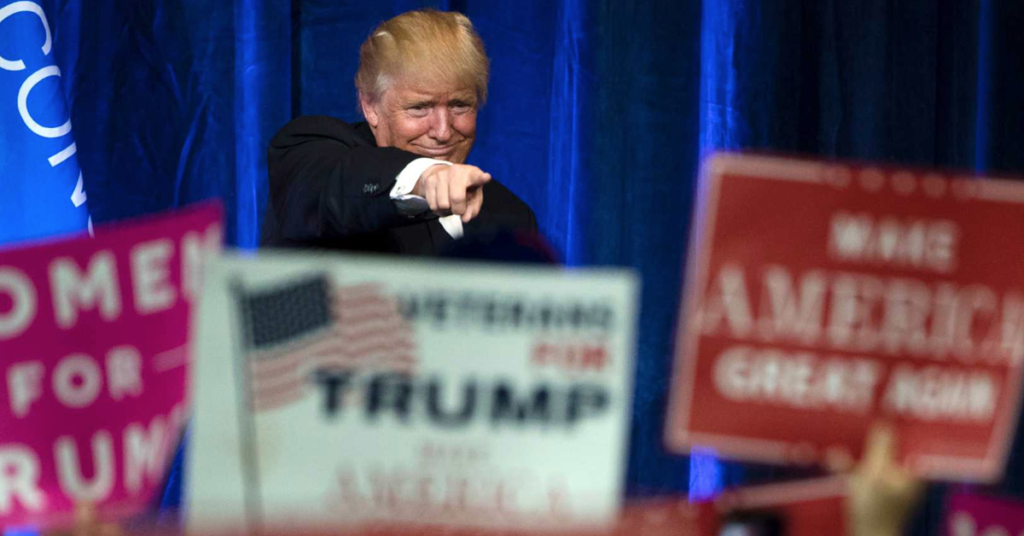
On election night, when Donald Trump claimed victory in her home state of Wisconsin, Shay Chamberlin was so excited she screamed and fell over. Chamberlain believes Trump is her savior, sent by God to save America from ruin. She owns a women’s clothing store in this modest town; her husband runs a construction company. They have two children and barely get by on $44,000 a year, living paycheck to paycheck. In his victory speech, Trump called people like Chamberlain and her family America’s “forgotten men and women” – the blue-collar workers in the manufacturing towns of the Rust Belt and the hollowing coalfields of Appalachia who propelled him to an improbable victory. They felt left behind by progress, laughed at by the elite, and so put their faith in the billionaire businessman with a sharp tongue and short temper who promised to Make America Great Again. When Trump first ran, Chamberlain thought to herself: “That’s the man everybody has been praying for.” And she now feels vindicated by his victory. “This is a movement,” she said. “This isn’t a candidate anymore. This is a movement.” Not all of Trump’s support came from the blue-collar downtrodden. But the Republican’s overwhelming backing among whites with less than a college education is at least partly a reflection of how little the economic recovery since the Great Recession has benefited them. Their job opportunities have dwindled and their incomes have fallen, even as broader measures of the nation’s job market show improvement. But they also turned to him to hold back the tide of social change: same-sex marriage, transgender rights, a society growing more racially diverse. The white working class, long ignored, found an unlikely spokesman in Trump. He promised to build the wall to keep out immigrants. He promised to tear up trade deals that have ushered American factory jobs overseas. He promised to put blue-collar America back to work and restore the country to a time when white workers felt appreciated and fulfilled. “I feel like, not just most, but all Trump supporters are true patriots,” said 59-year-old Ginger Austin, who owns a graphics company in a tiny town in Jones County, one of the poorest places in North Carolina. “They love this country. But they’re taking our country away, and they’re changing it. They’re just changing everything. All our rights are just slowly being dwindled away.” She’s angry at the Republican Party she has supported all her life. She is angry at Barack Obama and the Affordable Care Act. She is angry that America is changing, and worried that her grandchildren are growing up in a world too liberal and too politically correct. The nation awoke Wednesday morning to learn just how starkly divided it has grown: Hillary Clinton won the popular vote by less than 200,000 ballots. But Trump won battleground states that had voted for Obama twice. Thousands of registered Democrats, including many former union workers from the mines and factories, crossed party lines and sided with Trump. For example, in Dunn County, where Shay Chamberlin lives, Obama beat Mitt Romney 53 percent to 46 percent in 2012, and John McCain 57 percent to 42 percent four years earlier. But it flipped to back Donald Trump, 52 percent to 41 percent, over Clinton. Scott Hiltgen, a 66-year-old small business owner in Wisconsin, called Washington a “cesspool” of career politicians, aware of and indifferent to the plight of the American worker. “We are considered flyover country, as you well know, and they don’t care about us,” he said. “And I think it was the silent majority that finally said, ‘Enough’s enough. We want a change. We don’t like the way things are going.’” Middle-aged white men with only high school degrees – the core of Trump’s support – saw their inflation-adjusted incomes plummet 9 percent from 1996 through 2014, according to Sentier Research, a data analytics firm founded by former Census Bureau officials. White male college graduates in the same age bracket, by contrast, saw their incomes jump 23 percent. The Great Recession wiped out millions of middle-income jobs in manufacturing, office administrative work and construction, and those jobs haven’t returned, even as the nation now has 6.5 million more jobs than it did before the recession began. In many parts of the country, they have been replaced with lower-income work in restaurants, hotels, and in home health care. This “hollowing out” of the nation’s economy has left many Americans with high school degrees feeling shut out of the middle class. Jerry Blackburn, a retired county official in rural Virginia, said he feels like people from someplace else took all they could from him and his neighbors and then left them with nothing. “They took our coal out of here and everybody got rich on it. And what did we get?” he asked. “We got black lung. We don’t have good water to drink, we don’t have roads, we don’t have anything except a bunch of broken down old coal miners that’s forgotten. But everybody else got rich on us.” On Wednesday morning, miners streamed into a convenience store on a highway between one struggling, West Virginia coal town and another. From behind the counter, manager Mary Jones recognized something she hadn’t heard in years: hope. They talked about jobs returning to this broken-down county. They talked about a chance at a brighter future. They talked about Donald Trump. “I think we sent a message to Washington that we’re tired of them sitting up there doing nothing to help the working-class people,” said Jones, a native of Wyoming County, where the collapse of the coal industry has left behind a string of tumbledown houses and a quarter of families in poverty. Coal trucks used to barrel by all day and the parking lot stayed full. No trucks come by anymore. The store is for sale. She’s not sure she’ll have a job much longer and is certain she won’t find another. They struggle to make enough money to pay
Effect of voting laws seen, but not enough to sway outcome
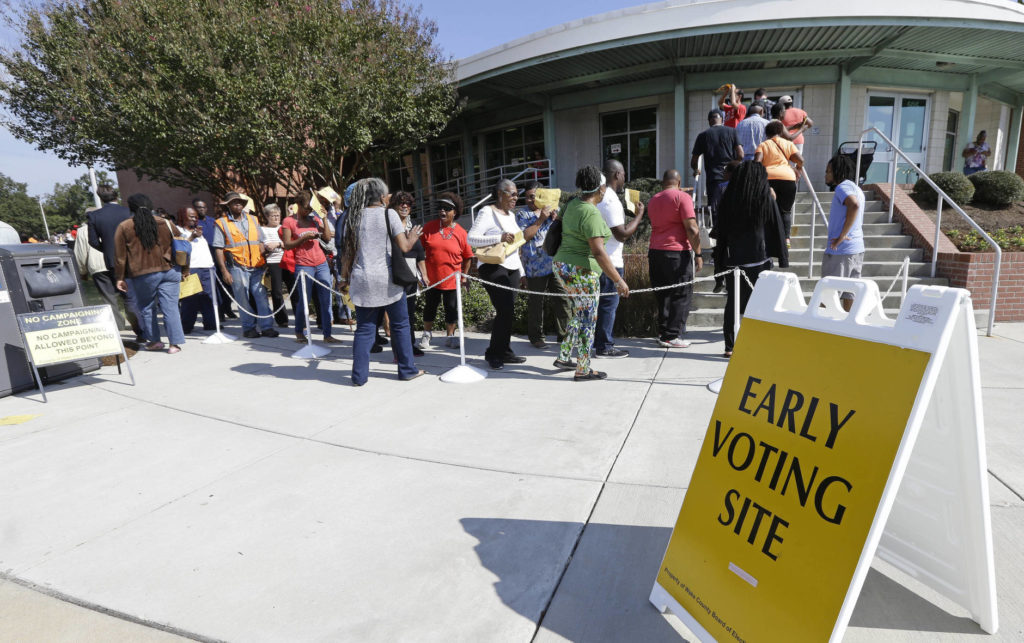
Fourteen states had new voting or registration restrictions in place for the 2016 presidential election, raising concerns that minority voters in particular would have a harder time accessing the ballot box. Voting experts believe the laws had some effect on turnout this year, but said it would be difficult to measure against other factors – such as a lack of enthusiasm for either Donald Trump or Hillary Clinton and the decision of many people simply not to vote. They expressed frustration that some states had made it more difficult for voters to participate, even if there is no evidence the changes influenced the outcome of the presidential election. “There were clearly many people who bore the brunt of new voting restrictions or who were otherwise unable to participate, and that is not acceptable in a democracy,” said Wendy Weiser, head of the democracy program at the Brennan Center for Justice at NYU’s School of Law. She said a few battleground states won by Trump were among the states that had enacted restrictions in recent years, including Florida, Ohio, North Carolina and Wisconsin. In some of the states, the margins between Trump and Clinton were simply too great for voting restrictions to have been a deciding factor. But Weiser said the roughly 27,000-vote difference in Wisconsin was concerning, given the turmoil surrounding the state’s voter ID law. With lower than expected turnout, Trump was the first Republican since Ronald Reagan in 1984 to win the state. It’s been estimated that as many as 300,000 Wisconsin voters did not have the required photo ID. Molly McGrath, with the national group VoteRiders, spent Tuesday fielding dozens of calls from voters who had questions about the law. In one case, she picked up a 99-year-old retired university professor named Fred at his polling place and drove him to a DMV office so he could get his photo ID. He had let his license expire, preferring instead to walk or ride his bike. “How many Freds are there? How many Freds decided not to call?” McGrath said. “There is 100 percent no doubt in my mind that people fell through the cracks and didn’t have their votes counted. And when we see the numbers of how close this election was, we should all be unsettled by that.” With black and Hispanic voters, Trump apparently did as well as Republican Mitt Romney when Romney lost to President Barack Obama in 2012, according to exit polls. Trump appeared to have won more than half of white voters, who made up 70 percent of the electorate. The 2016 election was the first without a key enforcement provision of the Voting Rights Act that had required some states and counties to receive approval before enacting new election laws. The 2013 U.S. Supreme Court ruling setting aside that requirement opened the way for voter ID and other measures that reduced early voting, straight-ticket voting and same-day registration. Those actions were taken primarily by Republican lawmakers, who said they were targeting voter fraud. Even though court decisions have rolled back some of the more far-reaching restrictions, civil rights groups were concerned that confusion over the laws could deter voters. Sandy Fambrough, a deputy poll judge in Denton County, Texas, said she witnessed violations of court-ordered changes to the state’s voter ID law. Texas was forced to soften its voter ID law after a federal appeals court deemed it discriminatory. Under the original law, it was estimated that some 600,000 eligible voters didn’t have an acceptable form of ID. “Who knows how many people didn’t vote because they were given the wrong information?” Fambrough said. In North Carolina, voter ID requirements and early voting reductions were struck down after a federal appeals court said they “target African Americans with almost surgical precision.” Republican officials have said discrimination was not their intent. After some North Carolina counties reduced hours and polling places during the first week of early voting, one researcher found black turnout was down 13 percent compared with the 2012 election. On Tuesday, Trump won the state by about 178,000 votes over Clinton. “Even if those states didn’t have those laws, it’s not at all clear that the outcome would have been any different,” said Rick Hasen, an election law expert and professor at UC Irvine’s School of Law. He said he would not be surprised if more states pass restrictive voting laws in the years to come. “It’s not hard to imagine that this will give a green light to engage in ever more restrictive voting laws,” he said. Republished with permission of the Associated Press.
Will Lochamy: There’s no crying in politics?
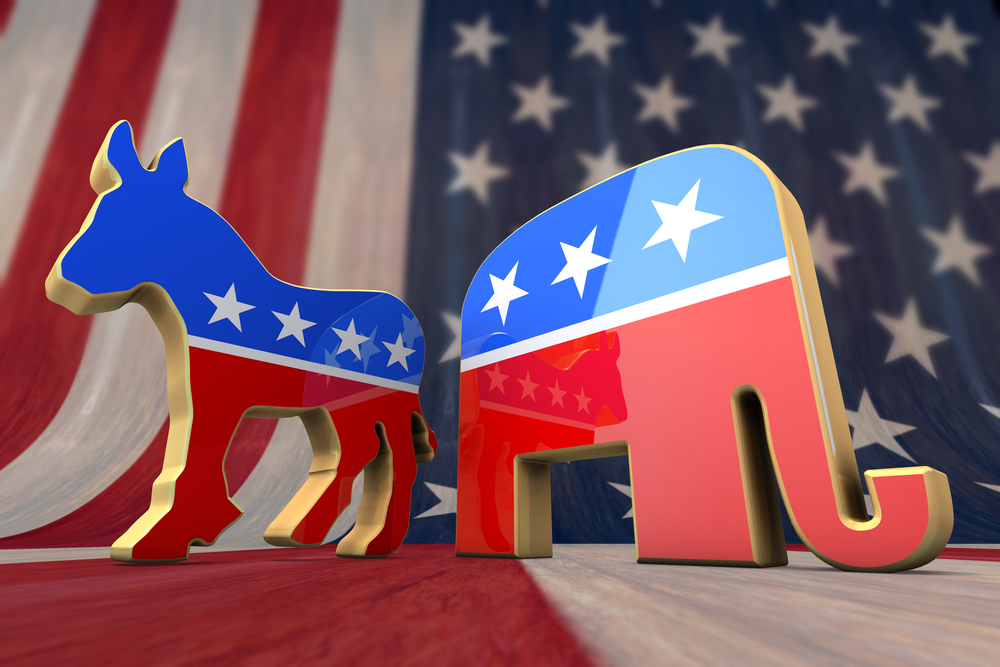
I’d much rather laugh than cry. My brother and I joked about how we regretted taking our grandmother frosties each time we visited her. This joke was told to the other pallbearers as we all strained to carry her to her final resting place. God rest her frosty loving soul. We’ve all had laughs over the past sixteen months. There’s no way around it. Donald Trump’s campaign was a political barrel of monkeys. If you were for him, you could laugh at the jabs he was taking at the seasoned politicians as he called them insulting names and picked them off one by one. If you were against him, his daily speeches that showed his inaccuracies, uninformed strategies, and social missteps were basically a tickle machine that allowed free entry. It was political satire like we’d never seen. The joke started to become less funny to me on the evening of November 8th. It was like a horse had ACTUALLY walked into a bar, except I was the one with the long face. To be honest, this is the worst case of horse-face I can recollect. I’m a glass half-full guy, so I’m going to try my damnedest to see it that way. Here we go… Half-full: Ummm… ok… Oh, I’ve got one! Politicians are the worst. Beyond small town city councilors, you don’t get very far without serving special interests. Think of the corruption it takes to make it all the way to the top! Trump is the furthest thing from a seasoned politician! But… Having never served in public office or the military leaves him as qualified as… well, as all of us other completely unqualified folks. Last Saturday, my friends and I came up with a better plan to fix this health care mess than Trump has, while simultaneously yelling at a replay official. Granted, Trump hasn’t actually given a plan. We just know it’s going to be the best, whatever it is. Half-full: For real, the Affordable Care Act has been anything but affordable for me. I’m now paying ridiculously high premiums and getting a fraction of the benefits I previously had. Small business owners I know tell me it’s been borderline crippling. Trump says he’s doing away with it! But… I believe that solid healthcare is something that EVERY American deserves and there are a lot of people less fortunate than me that have benefitted from it. While I think changes need to be made, I’d like to hear an actual plan. I haven’t from Trump. Half-full: Trump said in 2015 that he preferred “a fair tax, a flat tax or certainly a simplified code.” That’s what I think too! But… He has since moved away from that language and now uses broad, unspecific, and usually contradictory statements. No reason to spill the beans too much on taxes… right, Donald? Half-full: There’s no way he’s as blatantly racist and sexist as he acted during the first seventy years of his life!? He surely has the ability to tone it down and act rational while holding the most powerful job in the world. But… That’s what we thought he’d do after the primaries. It was never Trump’s bigoted statements that really worried me. It was my fellow citizens that cheered in support. I was able to halfway laugh off the small minority of people acting out on his behalf. After all, the Klan is, has, and always will be a joke. It was when I saw extended family members and enough voters to take the electoral college supporting him that I stopped laughing. Half-full: At least Hillary didn’t win. But… Here’s the thing. I’ve been a Hillary antagonist since my grandparents took me to an anti-universal healthcare rally as a child. I even held a sign saying, “Government Run HealthCare Makes Me Sick!” For one reason or another, she always rubbed me the wrong way. With Trump as the Republican nominee, I had to come to grips with the possibility of voting for her. I would much rather abstain than vote for the lesser of two evils, so I felt it only fair to do some research. I found a lot of the things you’d expect. She’s tied to plenty of special interest groups, the email stuff, and so forth. However, I didn’t find any of her actions to be worse or more self serving than other political heroes from BOTH parties. From my research (most of which was done to prove Facebook friends wrong), I found that she hadn’t seemed to have gotten a fair shake. There were a number of things being said about her every day that simply weren’t true. These were things that I’d known as “truths” for years. So the bartender says, “why the long face?” “Because I’m a horse… I have a long face,” said the horse. Let’s hope we’ll all look back and laugh, rather than cry. Writer’s note: This is the tip of the iceberg for me. There is more I could say about both candidates. Much more. However, this is the synopsis of my novel. Will Lochamy is co-host of the radio show, “Oh Brother Radio” on Birmingham Mountain Radio (107.3FM).
GOP maintains influence over most legislatures, state policy
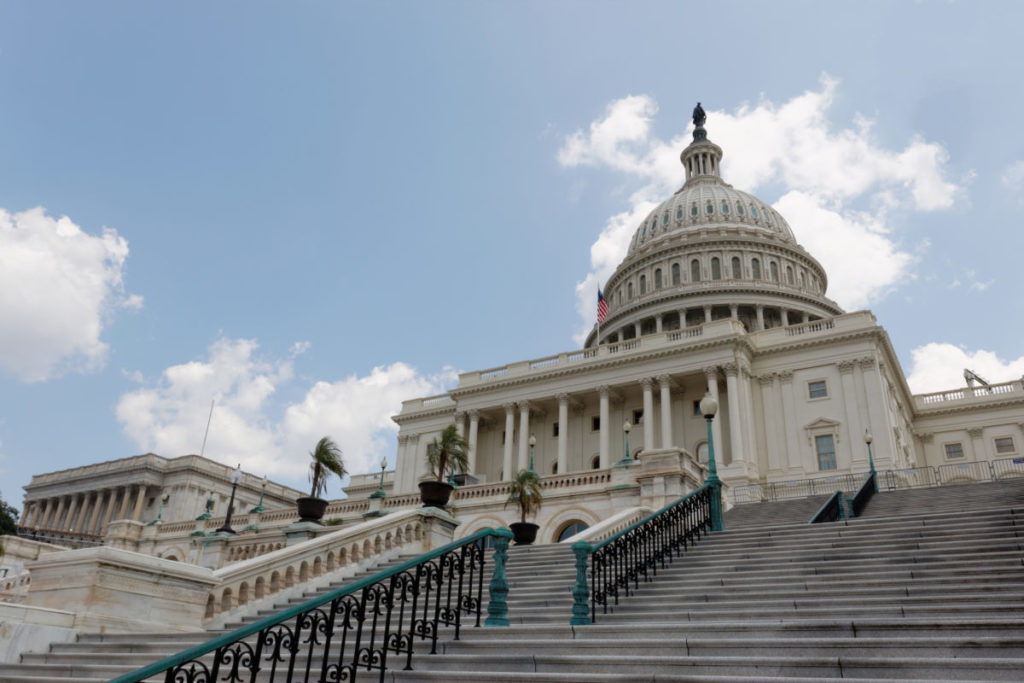
Buoyed by Donald Trump‘s surprising strength, the Republicans maintained their control over a large majority of state legislatures across the country, setting up the GOP to enact conservative policies and potentially cement its political power for years to come. Democrats had seen 2016 as a chance to chip away at the large advantage in statehouses the Republicans have enjoyed since 2010. But in state after state, they fell short. With Tuesday’s results, the Republicans will control at least as many legislative chambers as they do now – 68 out of 99, an all-time high for the GOP. And they will have full control of 33 legislatures, up from 31. (That includes Nebraska, which has a technically nonpartisan, single-chamber legislature.) The Democrats will be in full command in 13 states. Republicans scored major victories by taking control of the Iowa and Minnesota Senates and the Kentucky House. They also held on to their majorities in chambers in several states that had been targeted by the Democrats, and apparently gained a tie in the previously Democratic-controlled Connecticut Senate. The GOP wave also extended to governor’s races, where Republicans were expanding their sizable majority of seats. The election wasn’t a total loss for Democrats. They picked up both chambers in Nevada and the House in New Mexico. They also took a one-seat advantage in the Washington Senate, but they still won’t have operating control, because one Democrat caucuses with the Republicans. The results give Republicans a better chance of directing the redrawing of congressional and legislative districts that the states will undertake after the 2020 census. That, in turn, could help the GOP maintain its grip on power for years. Some Democrats said they think the party could bounce back and gain the upper hand during redistricting. “If a Trump presidency at all resemble the Trump candidacy, Democrats nationwide will be buoyed by Republican backlash in the next two election cycles,” Carolyn Fiddler, a spokeswoman for the Democratic Legislative Campaign Committee, said in an email. More immediately, the Republicans’ successes on Tuesday could have implications for joint state-federal programs such as Medicaid, infrastructure funding and energy policy, all of which could change dramatically under a Trump administration. “It’s an obvious and unavoidable trend at this point,” said Matt Walter, president of the Republican State Leadership Committee, which ran TV ads on behalf of legislative candidates in Kentucky and other competitive states. He said he expects more state control of health insurance if President Barack Obama‘s Affordable Health Care Act is scaled back or repealed. Anti-union right-to-work laws also could expand in the states. Stephen Voss, a University of Kentucky political scientist, said he expects rapid change in policies in his state with Republicans now firmly in control, including perhaps programs that use taxpayer money to send students to private schools. With the Kentucky win, Republicans now control every state legislative chamber in the South. One Democrat ousted was Greg Stumbo, the House speaker and former state attorney general who was a major force in Kentucky politics for decades. He represents a rural district where Hillary Clinton was especially unpopular. Republicans appeared to hold onto many legislative bodies that Democrats went after hard, including the Senate in West Virginia and the House in Michigan. In Iowa, the Republicans stunned the Democrats to easily take control of the Senate by picking up at least six seats in the 50-seat chamber. They needed to flip just three districts to win the chamber. The election swept out Senate Majority Leader Mike Gronstal, a powerful Democrat who had been a fixture in state government for three decades. Democrats had credited Gronstal in recent years with blocking GOP efforts to roll back gay marriage and abortion rights, enact restrictions on voting and limit the clout of public employee unions. They were devastated by his defeat. “That’s very bad for our state,” said Democratic activist Julie Stauch, who fought back tears Wednesday. She called Gronstal a party leader who would “wield power for good. And that’s lost.” Republicans now control the Iowa governor’s office and both houses of the General Assembly for the first time since the late 1990s. Republished with permission of the Associated Press.
Analysis: Donald Trump’s victory a reversal of fortune for Barack Obama
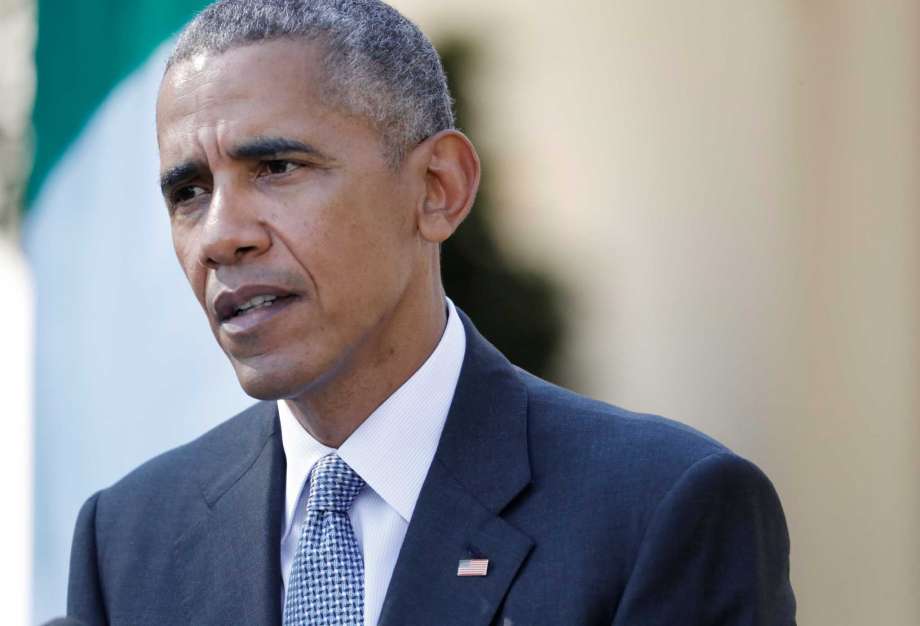
He warned that Donald Trump was dangerous, a nuclear hair-trigger, proud to get away with sexual assault. And now it falls to President Barack Obama to reassure America that it can survive four years of President Trump. The impulsive billionaire’s improbable victory sets in motion a remarkable reversal of fortune for Obama. He had planned to coast through his final months while ushering in a simpatico Hillary Clinton, but will instead spend his time presiding over a country that is divided, anxious and has little idea what’s coming next. Riding approval ratings higher than at any time since he was first elected, Obama was poised to become one of the country’s most consequential leaders – a modern-day Franklin Delano Roosevelt, with a wealth of domestic and foreign accomplishments that most presidents would envy. He still may – but not if Trump succeeds in carrying out what he’s said he plans to do. Trump rooted his campaign in a pledge to systematically roll back Obama’s achievements, on health care, immigration, climate change, trade, international relations and more, and soon will have the tools to do it: the first single-party control of both Congress and the White House since Obama’s first two years in office. Mindful that his legacy could be pulled out from under him, Obama said last week that a Trump victory would mean “it all goes out the window.” It was unsurprising, then, that the mood at the White House was despondent the day after Trump’s triumph. White House aides who had gathered with friends Tuesday to witness the election of the first female president instead found themselves asking the next morning whether the last eight years would end up a fool’s errand. There were tears – lots of them – on the faces of a few hundred Obama staffers who gathered in the Rose Garden as Obama delivered his post-election statement to reporters. Looking dazed and queasy, they stood on the grass and listened as Obama assured them their efforts hadn’t been for naught. “That remarkable work has left the next president with a stronger, better country than the one that existed eight years ago,” Obama said, standing with Vice President Joe Biden. “Sometimes you lose an argument. Sometimes you lose an election. The path that this country has taken has never been a straight line.” If Obama was as depressed about the election’s outcome as most suspected, he didn’t show it. White House officials said he felt a responsibility to calm the nation after a bruising, divisive campaign in which the victorious candidate offended wide swaths of the country. Obama’s aides said the president took a measure of solace that many of Trump’s policy prescriptions have been vague and open-ended, perhaps allowing him more wiggle-room to preserve some of Obama’s achievements than other Republicans like Texas Sen. Ted Cruz might have had. And they held out hope that the socially moderate Trump, who once supported abortion rights and has proposed paid family leave programs, might end up having more in common with Obama than is immediately apparent. Yet by reducing Clinton’s loss to a version of “you win some, you lose some,” Obama glossed over the dark vision of Trump’s America he’d painted for voters as the campaign neared the finish. Casting Trump as an existential threat in ways other GOP nominees were not, Obama told rally-goers that the world was “teetering” and that “the fate of the Republic rests on your shoulders.” Less than 12 hours after the race was called for Trump, the White House had softened its tone. The administration noted that as president-elect, Trump is entitled to the same daily intelligence briefing as Obama receives – one that includes information on U.S. covert operations, information gleaned about world leaders and other data gathered by America’s 17 intelligence agencies. Where Obama had once deemed Trump unfit to get anywhere near the nuclear codes, the White House instead referred to policy differences not wholly unlike the ones that previous consecutive presidents have had, with no disastrous consequences for the nation. “By relying on our institutions and democratic traditions, demonstrating a faithful commitment to the will of the American people, our democracy hasn’t just survived, it has thrived,” White House spokesman Josh Earnest said. Republished with permission of the Associated Press.
Martha Roby faced tough re-election after criticizing Donald Trump, but has no regrets

U.S. Rep. Martha Roby was elected to a fourth term Tuesday night but may have paid a political price for being one of the few Republicans in the Deep South state to speak out against Donald Trump. Roby was forced into a closer than expected race after 29,000 write-in votes drained support from the GOP incumbent in the wake of her criticisms about Trump. Roby was victorious over her challenger by about 23,000 votes, a comfortable win. However, it was far short of the 2-1 victory margins enjoyed by most other GOP incumbents on election night in Alabama. Unofficial returns compiled by the Alabama secretary of state show that at least 29,000 write-in votes were cast in the conservative 2nd Congressional District that stretches from Montgomery through rural southeast Alabama. Roby said last month that she could not vote for Trump after recordings surfaced of Trump in 2005 making lewd comments about being about able to grab women because he is famous. “Donald Trump’s behavior makes him unacceptable as a candidate for president, and I won’t vote for him,” Roby said in October. She said Trump should step aside and let a responsible Republican lead the ticket. “That was the final straw,” William Silaghi, a former air traffic controller and Air Force veteran, said of Roby. Silaghi said he thought Trump’s 11-year-old comments were a lesser concern that Hillary Clinton’s use of a private email server as secretary of state. He urged people to write in Becky Gerritson, a tea party candidate who lost to Roby in the primary. “I hope it sends a message to Mrs. Roby that she better start listening to her constituents,” he said Wednesday. Roby, in an interview Wednesday, said she did not regret her decision but respected those who differed in opinion. “I understand that there were people who disagreed with that, and they had the opportunity yesterday to voice that disagreement at the polls,” Roby said. “Whether you voted for me or not, I’m still going to fight for you. I’m still going to listen to you and advocate on your behalf and be there to help when you have a problem,” she said. “I congratulate Mr. Trump, and I’m not only forward to working with him — I’m eager to get to work,” she said. Roby’s comments about Trump came without hope of political gain in a state that Trump was expected to easily carry. Gerritson said she did not start or push the write-in effort on her behalf. Doing so would put her in jeopardy of violating GOP loyalty rules and could make it difficult to run again under the Republican label. Gerritson — who has now twice lost to Roby — said she is uncertain if she will run again. “I’ve not the closed the door on it,” Gerritson said. Republished with permission of the Associated Press.
Ronda M. Walker: How to recover from our election hangover
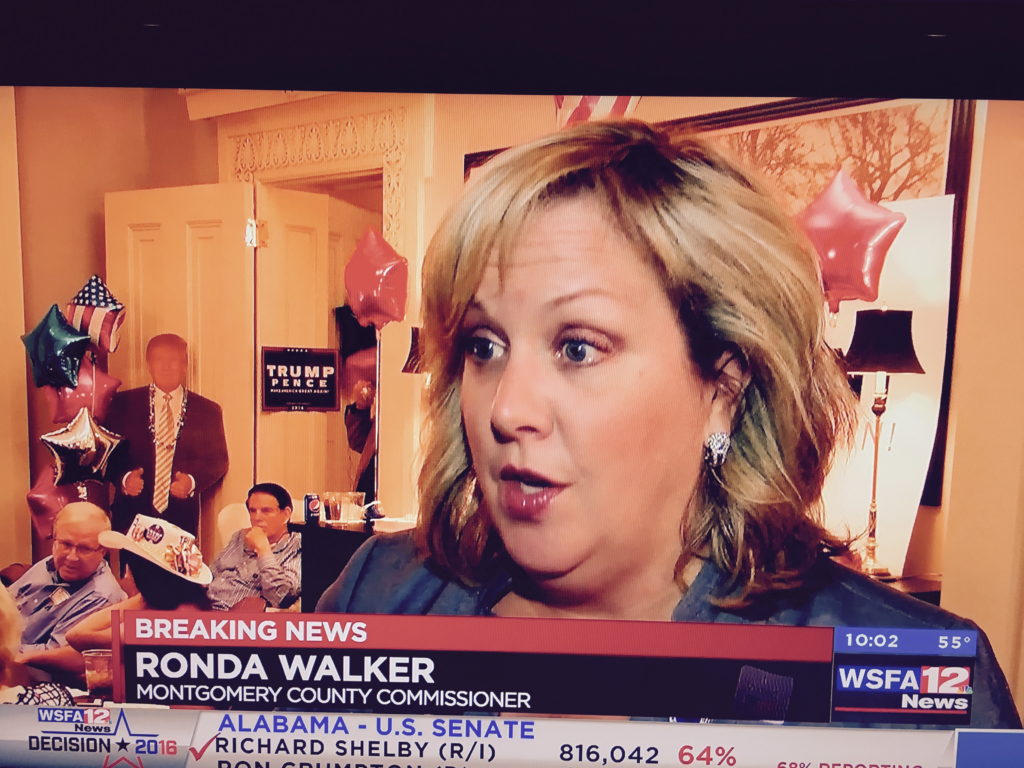
How do we recover from our election hangover? I was 20 years old when I had my first opportunity to vote in a presidential election. I was thrilled! I had my candidate’s bumper sticker on my car and I was confident he would be victorious. He lost. Four years later I had another opportunity to pick a presidential candidate and I did so with enthusiasm. This time I actually knew my candidate. Although I did not know him well, we did meet and I enjoyed his sense of humor and his dedication to public service as well as his commitment to coalition building. I just knew he was the best person to lead our country and I was proud to vote for him. He lost. Of the seven presidential elections I’ve voted in, my chosen candidate won only three times. I’ve known the thrill of victory, but more often I’ve felt the agony of defeat. The American people have endured a brutal campaign season the past 18 or so months. A campaign that came to a conclusion last night as election results rolled in state by state. We have a winner. An unpredicted winner. The polls, practically all of them, were wrong. The media was wrong. We are all experiencing some level of shock today. For some it’s an exuberant shock, for others devastating shock. About 50 percent of the popular vote went to the loser. So how do we recover? How do we move past the disappointment, hateful rhetoric, and divisive Facebook posts? First, we remember that our representative democracy is the best system on earth. The average American has a voice regarding our governance. Win or lose, our votes matter, we can vote representatives in and out of office. Our democracy has weathered the test of time. Although comparatively we are a young nation, we have presented our system of government many unique challenges and she has risen to the task and handled them beautifully. Second, whether you believe it or not, this is not the worst time in American history. Many will say they have never seen our nation so divided. They have never seen such dark and difficult days. To those that believe this is bad as it’s ever been, I encourage you to read up on your American history. Just a quick survey of the past 150 years is replete with examples of times that were far worse. From the horrors of slavery to the blood spilled in civil war. From the growing pains of shifting from an agrarian society to an industrialized society. To a global war, then a second global war. To the Great Depression and Dust Bowl. And remember the time we fought back against a murderous Nazi psychopath and won. We refused to allow our fellow citizens to be denied basic civil rights. We have seen our buildings fall and our sense of personal security shattered. We have seen tough times and we have persevered and come out stronger on the other side. But in order to recover from this election hangover there are a few specific things we all must do. First, pick up a history book. Refresh your knowledge about the founding of this nation, about the trials and tribulations we have faced and overcome. Second, diversify your sources of news and information. Do not make the mistake of relying on only one news source to keep yourself informed. Be it television, newspaper, or blogspot — diversify. Third, scale back your exposure to social media and expand your exposure to actual people. You have to understand that people paid specifically to stir the pot of hate and divisiveness write many of the comments on social media. Reading the comments gives you a false sense of reality. Enjoy social media as a medium to see photographs of your friends’ children, and to share your favorite recipes, but don’t use it as a source of news and information. Fourth, expand your circle of friends. There was a time I believed the majority of people in America had a four-year college degree. Because, most everyone I knew had one so it stood to reason others did too. The fact is only about 30 percent of Americans have a four-year college degree. If we have a tight circle of friends that think, look, and live like we do, we begin to experience a skewed sense of place. When is the last time you had someone into your home for a meal that has a different color skin than you? When is the last time you had a reasonable and respectful conversation about a controversial topic with someone who disagrees with your views? When is the last time you drove to the other side of town to shop at a store or dine at a restaurant? Do all of those things. If we avoid confronting our fear of the Other, then that fear grows and festers. However, if we face our fear, we will quickly realize our concerns of the unknown were largely unfounded. Is there someone in your workplace, church, or neighborhood you don’t trust? Get to know them. Do you have a local leader who made a decision that you disagree with? Instead of running them down behind their back or in a letter to the editor, call them on the phone and discuss the issue personally. I bet they would appreciate the opportunity to speak to you directly. Healing from the hate, fear, and divisiveness will only come through relationship building on a local level and that can happen regardless of who occupies 1600 Pennsylvania Avenue. As individuals, most of us cannot effect significant change on the national level. But what you can do is take your sick neighbor a meal. You can reach out to the child of the single mom who struggles to find enough time to spend with them because she works three jobs. You can ask that coworker to lunch that rubs you the wrong way. Endeavor to actually
Donald Trump rides his movement to vindication and the White House
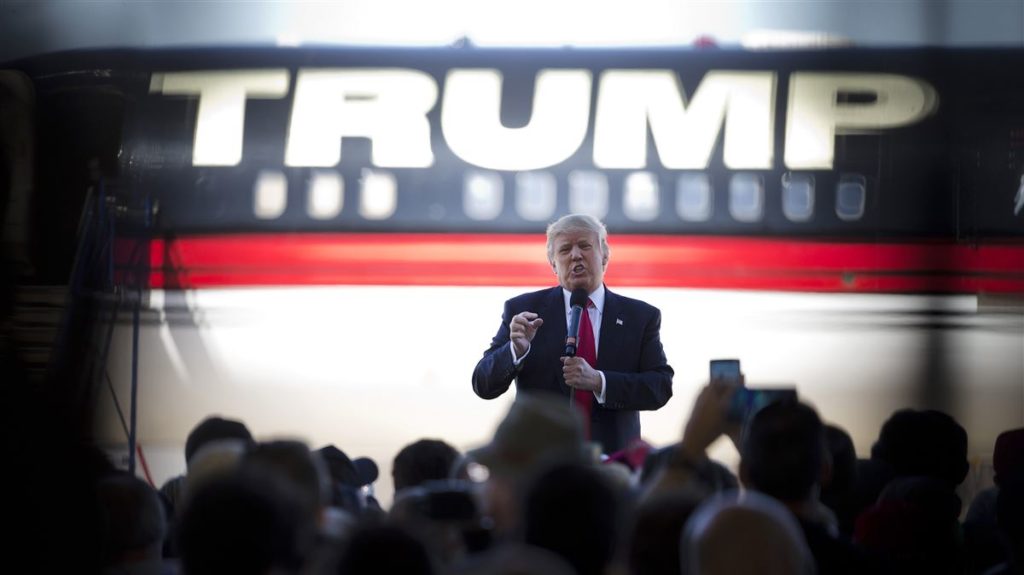
Donald Trump awakened a movement of angry working-class voters fed up with political insiders and desperate for change. On Tuesday, that movement propelled him to the White House. Trump’s stunning, come-from-behind victory over Hillary Clinton – a far more organized and experienced rival – served as a raised middle finger to the political establishment from his fervent backers. “I have been so ready for this,” said Oklahoma resident Holly Berry, who flew all the way from Tahlequah to celebrate at Trump’s victory party in Manhattan. Berry, who works in sales, said that she can no longer afford her health insurance, which has spiked 86 percent. “People are sick and tired,” she said. “This country’s fed up with everything. We’re ready for a change. We’re ready for lower taxes, ready for our economy to grow, we’re ready for jobs.” But to millions of others, the billionaire businessman’s elevation to the presidency is a shocking and terrifying reality that will take time to comprehend. Many see the president-elect as a bigot and a misogynist unfit for the office. “He scares the daylights out of me,” said Wendy Bennett, a Democrat and government worker from Reno, Nevada, who cast her ballot for Clinton. “I think his personality is going to start World War III. He reminds me of Hitler.” Lisa Moore, a registered Republican from Glen Rock, New Jersey, crossed party lines to vote for Clinton, who would have been the nation’s first female president. “As a woman, in good conscience, and as the mother of a daughter, I can’t vote for somebody who’s so morally reprehensible,” said Moore, an exercise instructor. The 2016 election was vindication for Trump, a former reality TV star who was underestimated from the start. While pundits assumed his poll numbers would sink as soon as voters started taking the race seriously, Trump was drawing thousands each night to rallies packed with angry, largely white supporters who felt ignored and lied to by Washington. While statistics showed the U.S. economy improving overall, it didn’t feel that way in places like upstate New York, Pennsylvania’s coal country and former manufacturing towns across the Midwest devastated by outsourcing and globalization. Chaos abroad only added to the feeling that the country was sliding backward. Together, those factors drove a yearning to return to a simpler time when America was the world’s undisputed superpower and middle-class wages were on the rise. “We have our fingers in too many baskets,” said Joe Hudson, 49, an engineer and registered Republican from Virginia Beach, Virginia, who said he would be voting for Trump because “we’re not taking care of our own people.” “We’re trying to be too involved in world politics. And our country is imploding from within,” he said. “We need a new direction, a new attitude, and people to stop arguing and letting the media affect how we feel.” Trump’s vow was simple: He’d “Make America Great Again.” His outsider status, coupled with his personal business success, lent credibility to a populist message that emphasized recapturing manufacturing jobs, restoring American strength abroad and curtailing legal and illegal immigration. Trump promised to immediately create new jobs, end conflicts abroad and – in Trump’s words, “win again” Trump, early on, painted his supporters as a “movement” larger than himself. “This isn’t about me; it’s about all of you and our magnificent movement to make America great again all over this country. And they’re talking about it all over the world,” he said at a rally in Miami last week during the race’s furious final stretch. “There has never been a movement like this in the history of our country – it’s never happened. Even the pundits, even the ones that truly dislike Donald Trump, have said it’s the single greatest phenomena they have ever seen.” But as he worked his base into a frenzy and locked down one primary win after the next, Trump was also repelling large swaths of the populace – including women, college-educated whites and minorities – with his deeply divisive rhetoric. Trump launched his campaign with a speech that accused Mexico of sending rapists and other criminals across the border. He later questioned 2008 Republican nominee and former POW John McCain‘s status as a war hero, saying he preferred people who hadn’t been captured. He mocked a disabled reporter. And he called for a “total and complete shutdown of Muslims entering the United States until our country’s representatives can figure out what is going on” – a blanket religion test denounced by many as un-American. After securing his party’s nomination, Trump questioned a federal judge’s ability to treat him fairly because of the judge’s Hispanic origin, repeatedly insulted a Muslim-American family whose son had been killed in Iraq, and got into an extended spat with a former beauty queen, at one point instructing his millions of Twitter followers to “check out” her non-existent sex tape. Again and again, Trump appeared poised to close the gap with Clinton, only to go off on a tangent that would send his poll numbers tumbling. Then came the release of shocking old video footage from an “Access Hollywood” bus in which Trump bragged about being able to grope women because he was famous. The video’s release was followed by a string of allegations from women who said Trump sexually harassed or assaulted them. Trump denied the accusations, at one point threatening to sue the women. But one October surprise was overshadowed by another. Trump’s numbers had already been rising with news of health care premium increases when the FBI director informed Congress that the bureau had found a new trove of emails potentially relevant to its investigation into Clinton’s use of a private email server a secretary of state. While the FBI eventually announced that there was nothing in the emails to merit criminal prosecution, the damage appeared to have been done. On Tuesday, Trump won a commanding victory, buoyed by a new Trump coalition. “It’s time to get together,” he said. Republished with
Analysis: Donald Trump’s win a shock to the system
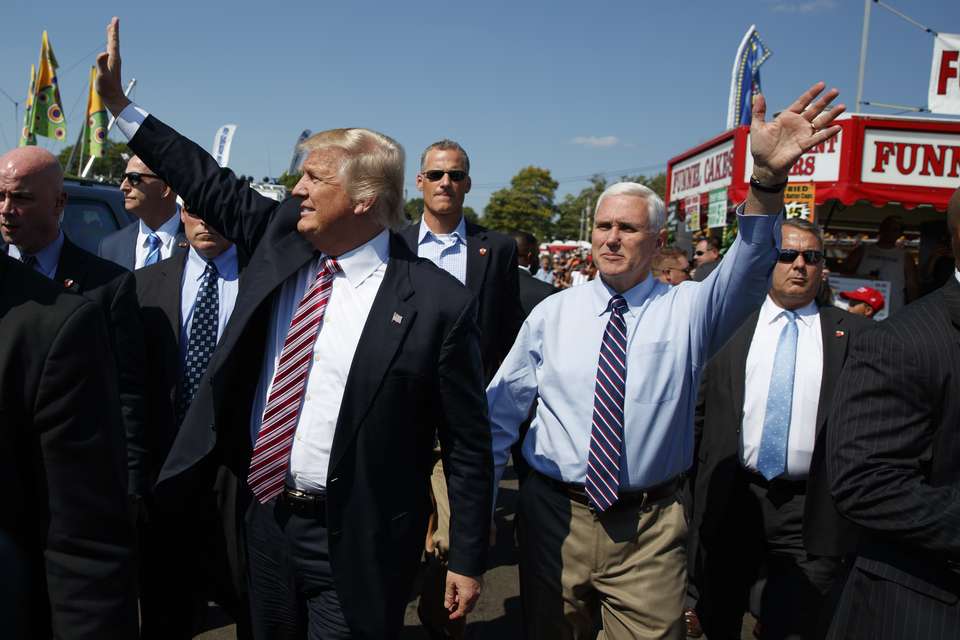
A shockwave. There’s no other way to describe the massive change Americans voted for Tuesday. In electing Donald Trump to the White House, Americans handed the reins to someone whose campaign was premised on an unrelenting challenge to the status quo, distrust in government and dismissal of the politicians from both parties. They chose a man who promised to channel their anger, as much as carry their hopes. He didn’t merely promise change, he promised disruption. The ramifications of the Trump presidency are difficult to measure. In his ugly, knock-down fight against Democrat Hillary Clinton, his personality was a draw more than his policies. The stump speeches that drew thousands to raucous rallies were laced with proposals but powered by his one word political philosophy: “Winning.” But it resonated in a way few expected with white, working-class America, across the Rust Belt and in rural communities, where the scars of the Great Recession endure and winning felt like a long-lost concept. He understood their anxiety about jobs moving overseas and immigrants moving in. He claimed to hate the liberal media as much as they did. He sounded like no politician ever. This was their uprising, the elevation of a 70-year-old reality-TV and real estate mogul willing to speak their truth, rewrite rules and insult anyone along the way. It is nothing short of whiplash – for Americans and people around the world who were alarmed by his harsh rhetoric about longtime allies and other cultures. Trump’s victory comes eight years after a coalition of blacks, Hispanics, women and young people elected the first black president and ushered in what many viewed as a new era of progressive dominance in presidential politics. Tuesday’s results are a stunning, if confusing, indictment of the policies of President Barack Obama, who nevertheless remains popular. “There’s nothing like it in our lifetime,” said presidential historian Douglas Brinkley, who in the days leading up the election dubbed a Trump win a “social revolution” on par only with Franklin Delano Roosevelt‘s clubbing of Herbert Hoover for his handling of the Great Depression in 1932. To many policy experts, economists, military brass, diplomats – the establishment, Trump would say – Trump’s proposals are viewed as improbable, impossible, and at times unconstitutional. Democrats and Republicans in Washington recoiled from his proposed ban on Muslims from entering in the U.S. Few think his vow to force Mexico to pay for a wall along the border is workable, at best. And really only Trump knows if his promise to “bomb the s–t out out of” the Islamic State group in Iraq and Syria seen is anything more than bluster. There’s mixed evidence on whether Trump’s victory is an endorsement of such plans. Voters sent enough Republicans back to the Senate to give the GOP control of both chambers, a clear government mandate. But for all the talk about immigration, exit polls showed it was a low priority for most voters. Just 1 in 10 voters said immigration was the most important issue facing the country. More than half of voters opposed Trump’s plan for a “big, beautiful wall.” Clearly, what many voters opposed was Clinton. The former secretary of state and veteran of two decades of political battles proved to be an exceedingly damaged candidate, distrusted both by her supporters and opponents alike. Her historic candidacy, to be the first female president, failed to rouse the enthusiasm or emotion that drove Obama’s coalition to the polls. Her disconnect with white, working-class voters appears to have been her downfall. Even Obama’s dire warnings – “the fate of the Republic rests on your shoulders” – didn’t do the trick. It wasn’t enough to scare people about a President Trump. Americans had fears about Clinton, too. Her penchant for secrecy was spun into scandal with brutal impact. Her use of a private email server as secretary of state not only dogged her for months – but returned at precisely the wrong moment in late October when FBI Director James Comey notified Congress he was reviewing new emails for evidence that she or her handlers mishandled classified information. Comey cleared Clinton again Sunday, but in the nine intervening days, as a cloud of suspicion hovered over her, nearly 24 million people cast early ballots. That’s a sizeable chunk of all the votes cast for president. Trump’s win made a mockery of all the usual political rules. He had virtually no ground game, his advertising on television didn’t come close to matching his rival’s. He largely ignored the practice of voter targeting and analytics, elevated to religion after Obama’s two victories. Clinton’s campaign raised $513 million – roughly double what Trump raised, including $66 million from his own pocket. While pollsters and political professionals in both parties dismissed him, he declared he had galvanized long-alienated voters into a movement. “The forgotten men and women of our country will be forgotten no longer,” Trump declared. Republished with permission of the Associated Press.
Hillary Clinton calls Donald Trump to congratulate him on victory

On the eve of the election, Hillary Clinton was standing behind a podium bearing the presidential seal. By the time the votes were counted, Donald Trump had captured the White House in a political earthquake. Clinton conceded the presidency to Trump in a phone call early Wednesday morning, a stunning end to a campaign that appeared poised right up until Election Day to make her the first woman elected U.S. president. Clinton, who watched the returns hunkered down with family and close aides at a Manhattan hotel suite, made no public appearance before supporters who had gathered under the glass ceiling of the Jacob K. Javits Convention Center planning to celebrate what was expected to be her historic victory. Clinton planned to make a statement later Wednesday morning. The mood inside the convention center grew increasingly grim as Trump captured battleground states like Florida, North Carolina and Ohio and shattered a longstanding “blue wall” of states in the Upper Midwest that had backed every Democratic presidential candidate since her husband, Bill Clinton, won the presidency in 1992. Democrats – starting with Clinton’s campaign and the White House – were left wondering how they misread their country so completely. Aides stopped returning calls and text messages. Supporters left election night parties in tears. “My disappointment makes me not trust the rest of the world,” said Katie Fahey, who had flown to New York from Grand Rapids, Michigan, wearing a red pantsuit, expecting a victory party. “I don’t even want to go out. I want to wear sweatpants and curl myself up in a corner.” The results were startling to Clinton and her aides, who had ended their campaign with a whirlwind tour of battleground states and had projected optimism that she would maintain the diverse coalition assembled by President Barack Obama in the past two elections. On the final day of the campaign, Clinton literally followed Obama to stand behind a podium with a presidential seal at a massive rally outside Independence Hall in Philadelphia. As she walked up to the lectern, the president bent down to pull out a small stool so the shorter Clinton could address the tens of thousands gathered on the mall. Before leaving the stage, Obama leaned over to whisper a message in Clinton’s ear: “We’ll have to make this permanent.” Clinton’s stunning loss was certain to open painful soul-searching within the party, which had endured a lengthy primary between Clinton and Vermont Sen. Bernie Sanders, who drew strong support among liberals amid an electorate calling for change. “The mistake that we made is that we ignored the powerful part of Trump’s message because we hated so much of the rest of his message. The mistake we made is that people would ignore that part and just focus on the negative,” said Democratic strategist Chris Kofinis, who was not affiliated with the campaign. The tumultuous presidential cycle bequeathed a series of political gifts for Clinton’s GOP rival: An FBI investigation into Clinton’s use of a private email server, questions of pay-for-play involving her family’s charitable foundation, Sanders’ primary challenge, Clinton’s health scare at a Sept. 11 memorial ceremony and FBI Director James Comey‘s late October announcement that investigators had uncovered emails potentially relevant to her email case. Yet her team spent the bulk of their time focused on attacking Trump, while failing to adequately address Clinton’s deep liabilities – or the wave of frustration roiling the nation. Every time the race focused on Clinton, her numbers dropped, eventually making her one of the least liked presidential nominees in history. And she offered an anxious electorate a message of breaking barriers and the strength of diversity – hardly a rallying cry – leaving her advisers debating the central point of her candidacy late into the primary race. Clinton’s campaign was infuriated by a late October announcement by Comey that investigators had uncovered emails that may have been pertinent to the dormant investigation into Clinton’s use of private emails while secretary of state. On the Sunday before the election, Comey told lawmakers that the bureau had found no evidence in its hurried review of newly discovered emails to warrant criminal charges against Clinton. But the announcement may have damaged Clinton while her campaign tried to generate support in early voting in battleground states like Florida and North Carolina. In the nine days between Comey’s initial statement and his “all clear” announcement, nearly 24 million people cast early ballots. That was about 18 percent of the expected total votes for president. Republished with permission of the Associated Press.
Donald Trump election elicits fears, some cheers around the globe

The world will face a starkly different America when President-elect Donald Trump takes the oath of office in January. While the billionaire businessman’s triumph was welcomed in some countries, others saw it as a big shock, as governments will now have to deal with a man who has cozied up to Russian President Vladimir Putin, told NATO allies they would have to pay for their own protection and vowed to make the Mexican government pay for a multibillion-dollar border wall. Leaders weren’t sure what to expect after a U.S. campaign in which Trump upended foreign policy orthodoxy on numerous fronts, including the international movement to contain the spread of nuclear weapons. Putin sent Trump a congratulatory telegram Wednesday morning and made a televised statement expressing the hope that frayed U.S.-Russian relations could be put back on track. He said Moscow is ready to try to restore good relations. “We aware that it is a difficult path, in view of the unfortunate degradation of relations between the Russian Federation and the United States,” he said, adding that “it is not our fault that Russian-American relations are in such a state.” Russia was at times a focal point during the U.S. campaign, with government officials and the Hillary Clinton campaign team suggesting the Russian government was involved in hacking her campaign’s emails. Trump expressed admiration for Putin and his tough leadership style, and some Clinton surrogates questioned Trump’s business dealings with Russia. Dmitri Drobnitski, a columnist at the popular, generally pro-Kremlin website LifeNews, said Trump’s victory will help the entire world. “I congratulate the American people with their will and with their democracy and with their strength and with their courage,” he told The Associated Press. “So this is not only a victory for the Americans, who defended their democracy against the liberal, global elite- no, this is a victory that the American people brought to the whole world.” Trump’s win caused trepidation in Mexico, where his remarks calling Mexican immigrants criminals and “rapists” were a deep insult to national pride. Trump has suggested slapping a 35 percent tax on automobiles and auto parts made by U.S. companies in Mexico. Financial analysts have predicted a Trump win would threaten billions of dollars in cross-border trade, and government officials say they have drawn up a contingency plan. “It’s DEFCON 2,” Mexican analyst Alejandro Hope said. “Probably something as close to a national emergency as Mexico has faced in many decades.” Trump’s electoral triumph is also being felt strongly in the volatile Middle East, where multiple crises are unfolding. In Iran, leaders emphasized the need to keep the historic nuclear deal between Iran and world powers on track despite Trump’s harsh criticism of it during the campaign. Iran’s president said Wednesday the deal “cannot be overturned by a single government.” Trump has suggested he would try to renegotiate the agreement under which Iran curbs its nuclear program in exchange for a gradual lifting of international sanctions. In Israel, Prime Minister Benjamin Netanyahu hailed Trump as a “true friend of the State of Israel.” Netanyahu said that he believes the two leaders “will continue to strengthen the unique alliance between our two countries and bring it to ever greater heights.” Palestinian President Mahmoud Abbas said that he hopes “peace will be achieved” during Trump’s term. Iraqi Prime Minister Haider al-Abadi congratulated Trump. In a statement on his website, al-Abadi said he hopes the “world and the United States will continue to support Iraq in fighting terrorism.” The Taliban called for the withdrawal of all U.S. forces from Afghanistan once Trump takes office. In a statement sent to The Associated Press, Taliban spokesman Zabihullah Mujahid said a Trump administration “should allow Afghans to become a free nation and have relationships with other countries based on non-interference in each other’s affairs.” In Europe, NATO allies will wait to see if Trump follows through on suggestions that the U.S. will look at whether they have paid their proper share in considering whether to come to their defense. Trump’s rhetoric has challenged the strategic underpinning of the NATO alliance, rattling its leaders at a time when Russia has been increasingly aggressive. “As a candidate, Trump called into question NATO and trade agreements, and reached out to Moscow,” said Daniela Schwarzer, an expert on trans-Atlantic relations at the German Council on Foreign Relations. “His campaign of discrimination, lies and aggression harmed the principles of liberal democracy. Even if President Trump doesn’t implement everything, Germany and Europe can’t rely on the trans-Atlantic partnership as usual and have to stand up for Western values themselves.” Trump’s victory pleased leaders of the nationalist Alternative for Germany party, which has campaigned strongly against Chancellor Angela Merkel‘s policy of letting hundreds of thousands of migrants into the country. “It was high time that people disenfranchised by the political establishment get their voices back in the United States of America too,” party co-leader Frauke Petry said. The French populist, anti-immigrant politician Marine Le Pen congratulated Trump even before the final results were known, tweeting her support to the “American people, free!” Trump’s victory was viewed with shock in Ireland, a country fearful of Trump’s campaign pledge to confront U.S. companies using Ireland as a tax shelter. Irish Times columnist Fintan O’Toole wrote Wednesday: “The republic of Washington, Jefferson, Lincoln and Roosevelt is now the United Hates of America.” In Asia, security issues and trade will top the agenda for the new administration, from North Korea and the South China Sea to the contentious and yet-unratified Trans-Pacific Partnership trade agreement. China is seen as favoring Trump because he appears less willing to confront China’s newly robust foreign policy, particularly in the South China Sea. Clinton, by contrast, was disliked in Beijing for having steered the U.S. “pivot” to Asia aimed at strengthening U.S. engagement with the region, particularly in the military sphere. Scholar Mei Xinyu wrote in the Communist Party newspaper Global Times that China would find it easier to cope with a Trump presidency. “Trump
Alabama politicians react to Donald Trump’s stunning victory

Republican presidential nominee Donald Trump scored a shocking and historic upset victory in the early hours of Wednesday morning, defeating Democratic nominee Hillary Clinton. Trump maintained an Electoral College count lead over Clinton throughout the early evening, and as the votes were counted overnight, Trump’s lead widened until he secured the necessary 270-plus electoral votes around 2:45 a.m. ET. Here’s what Alabama politicians have to say about Trump’s victory: U.S. Sen. Richard Shelby (via statement): Last night the American people roundly rejected the failed Obama-Clinton policies that aren’t working for our country. We now have the opportunity to come together to champion conservative causes and reverse the damage that has been done from big government policies like Obamacare and Dodd-Frank. I look forward to working with President-elect Trump and my conservative colleagues in Congress on commonsense solutions that will ensure a brighter future for all Americans. Alabama 1st District Rep. Bradley Byrne (via Facebook): Congratulations to President-elect Donald J. Trump and his entire team on tonight’s historic victory! It is time for new leadership in Washington. Now is the time for unity, and I look forward to seeing the positive change that will come from a unified Republican government. Alabama 2nd District Rep. Martha Roby (via statement): I offer my sincere congratulations to Donald Trump upon his impressive and decisive victory. There is much to do to get this country back on track, and I’m eager to get to work. As someone who has spent the last six years in Congress playing defense against the Obama Administration, I am eager to play offense to advance conservative priorities and to protect Alabama’s interests. No matter what, I will continue to fight on behalf of the people I represent and focus on the issues that matter to them. Alabama 3rd District Rep. Mike Rogers (via statement): As I have said before, Donald Trump was the only option for Americans to vote for as president. The people have spoken for real change and I congratulate Mr. Trump on his tremendous victory. For Republicans in Congress, we will now have a champion in the White House for our conservative agenda, to repeal and replace Obamacare, rebuild our national defense, and restore Constitutional rule. I look forward to working with the new Trump Administration to make America great again. Let’s get to work. Alabama 6th District Rep. Gary Palmer (via Twitter): Congratulations @realDonaldTrump – I look forward to working with you. This article will updated as additional comments are available.


